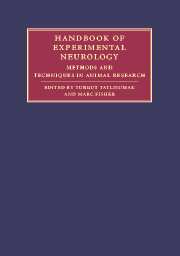Book contents
- Frontmatter
- Contents
- List of contributors
- Part I Principles and general methods
- Part II Experimental models of major neurological diseases
- 18 Focal brain ischemia models in rodents
- 19 Rodent models of global cerebral ischemia
- 20 Rodent models of hemorrhagic stroke
- 21 In vivo models of traumatic brain injury
- 22 Experimental models for the study of CNS tumors
- 23 Experimental models for demyelinating diseases
- 24 Animal models of Parkinson's disease
- 25 Animal models of epilepsy
- 26 Experimental models of hydrocephalus
- 27 Rodent models of experimental bacterial infections in the CNS
- 28 Experimental models of motor neuron disease/amyotrophic lateral sclerosis
- 29 Animal models for sleep disorders
- 30 Experimental models of muscle diseases
- Index
- References
19 - Rodent models of global cerebral ischemia
Published online by Cambridge University Press: 04 November 2009
- Frontmatter
- Contents
- List of contributors
- Part I Principles and general methods
- Part II Experimental models of major neurological diseases
- 18 Focal brain ischemia models in rodents
- 19 Rodent models of global cerebral ischemia
- 20 Rodent models of hemorrhagic stroke
- 21 In vivo models of traumatic brain injury
- 22 Experimental models for the study of CNS tumors
- 23 Experimental models for demyelinating diseases
- 24 Animal models of Parkinson's disease
- 25 Animal models of epilepsy
- 26 Experimental models of hydrocephalus
- 27 Rodent models of experimental bacterial infections in the CNS
- 28 Experimental models of motor neuron disease/amyotrophic lateral sclerosis
- 29 Animal models for sleep disorders
- 30 Experimental models of muscle diseases
- Index
- References
Summary
Introduction
Each year, about 500 000 people in the USA suffer a cardiac arrest, an event that is associated with high mortality and poor neurological outcome Survival rates range from 1% to 33%, and up to 60% of survivors have moderate to severe cognitive deficits 3 months after resuscitation. Frequent neuropsychological sequelae include anterograde memory deficits, learning difficulties, changes in emotional and social behavior, and depression. Despite improvements in resuscitation techniques, survival rates have not changed for decades. One reason for this disappointing development is the lack of effective treatment options to ameliorate reperfusion injury in the post resuscitation period despite promising results of a variety of agents in animal studies. However, recent clinical trials showed that induction of mild hypothermia in unresponsive cardiac arrest survivors can improve neurological outcome and 6-month survival. This was the first demonstration in humans that the development of brain injury after cardiac arrest can be positively influenced by a post-ischemic intervention, even with delayed onset of treatment.
This exciting evidence that ischemic human brain tissue is potentially salvageable has renewed interest in global cerebral ischemia research. In the following review we will describe the most commonly used rodent models of transient global or forebrain ischemia and summarize their advantages and disadvantages. The use of small animals for research studies presents some clear advantages over large animals. Rodents are much less costly to obtain and maintain for longer periods of time.
Information
- Type
- Chapter
- Information
- Handbook of Experimental NeurologyMethods and Techniques in Animal Research, pp. 329 - 344Publisher: Cambridge University PressPrint publication year: 2006
